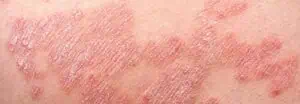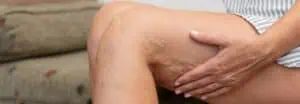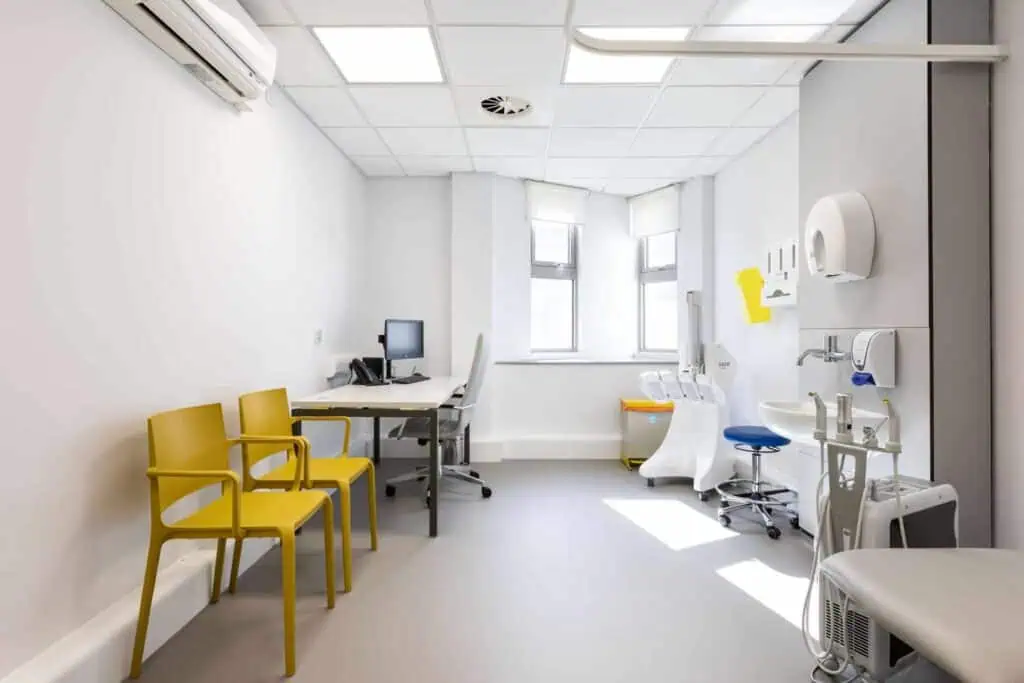Do you have unsightly or uncomfortable leg veins? While some leg veins are harmless, varicose veins can cause symptoms like pain, swelling, itching, and cramping. These threats can be mitigated with early detection and timely action, so don’t wait to be seen by your GP or in the NHS, be seen quickly by one of our Vascular Surgeons.
What are varicose veins?
Varicose veins are veins that have swollen, twisted, and become lumpy. Varicose veins can affect any vein, but they are mostly found in the legs. Veins are not always varicose but smaller Spider Veins can be just as unsightly and uncomfortable.
Varicose veins are sometimes misunderstood as merely a cosmetic issue, but this is not entirely accurate. It’s crucial to realise that vein disease can manifest itself in ways other than varicosities. Swelling, bleeding, skin injury, ulceration, and blood clots are all possible complications (thrombosis). In the worst-case situation, this can result in a pulmonary embolism, which is potentially fatal.
What causes varicose veins?
Varicose veins occur when the valves in the veins that carry blood back to the heart stop working properly. When these valves don’t work properly, blood can flow backwards and pool in the veins. This is known as reflux, which causes the veins to become enlarged and twisted. Although varicose veins can occur anywhere in the body, they’re most common in the legs and feet. TherSeveral factors cantribute to the development of varicose veins, including family history, pregnancy, obesity, and a sedentary lifestyle.
Varicose Veins symptoms and diagnosis
The most recognisable sign of varicose veins is contorted blue or purple lines just under the skin’s surface, which can cause discomfort when walking due to roughness against clothing and athletic activities. Other symptoms include:
- Bulging veins: Twisted, swollen, rope-like veins are often blue or purple. They appear just below the surface of the skin on your legs, ankles, and feet. They can develop in clusters. Tiny red or blue lines (spider veins) may appear nearby.
- Heavy legs: Muscles in your legs may feel tired, heavy, or sluggish, especially after physical activity.
- Itching: The area around varicose veins may itch.
- Pain: Legs may be painful, achy, or sore, especially behind your knees. You might have muscle cramps.
- Swelling: Your legs, ankles and feet can swell and throb.
- Skin discolouration and ulcers: Severe varicose veins can cause venous ulcers (sores) on your skin.
As soon as you feel pain or discomfort in your leg or have visible evidence of vein disease you should consider seeing one of our Vascular Surgeons for a Diagnostic Scan. This is also true if you have thread veins, spider veins or larger uncomfortable varicose veins.
A diagnostic scan can assess the health of your veins, and our vascular surgeons can provide you with a comprehensive treatment plan. Our Vascular Surgeons will work with you to develop a treatment plan that meets your needs and helps you improve your overall vein health.
What is the treatment for Varicose Veins?
Following the consultation and diagnostic scan, one of three treatment options would be recommended where vein disease has been confirmed.
- Foam sclerotherapy. This is used to treat superficial veins visible on the surface of the skin. Typically, one of three treatments may be needed to fully treat the veins.
- EVLA – Endovenous Laser Ablation. Endovenous laser treatment treats varicose veins using a fibre that is inserted into the vein to be treated, and laser light, normally in the infrared portion of the spectrum, shines into the interior of the vein. This causes the vein to contract, and the optical fibre is slowly withdrawn.
- Laser Treatment – For minor Thread or Spider veins, especially those on the face Laser treatment is a safe, effective way to banish thread veins. The light from the laser is directed at the veins causing them to heat up very quickly. This heat will cause the vein to break down and collapse in on itself which may present as some bruising on the skin’s surface.
After your treatment at our clinic, you will be able to return home and resume normal activities. We advise patients to take it easy for the rest of the day, but you should be able to go about your daily routine with no problem. Compression stockings are provided to patients to help with recovery. These stockings help to reduce swelling and discomfort after treatment.
The importance of compression stockings
Compression stockings are an important tool in the fight against varicose veins. By applying gentle pressure to the legs, they help to improve circulation and reduce swelling. Additionally, compression stockings can help to prevent the formation of new varicose veins and reduce the pain and discomfort associated with existing ones. For best results, compression stockings should be worn daily, ideally for at least four hours per day. They should also be removed before going to bed. With proper care and use, compression stockings can help to keep varicose veins at bay.
Varicose Vein Treatment at Stratum Clinics
The NHS is under immense pressure. The COVID-19 pandemic has caused staffing and funding issues, meaning that several treatments have become more difficult to access. One such treatment is varicose vein removal. Due to the current issues facing the NHS, waiting lists for varicose vein treatment have grown considerably. As a result, many people are forced to either suffer in silence or pay for private treatment.
At Stratum Clinics, we provide high-quality varicose vein removal at our state-of-the-art, consultant-led facilities. Our experienced vascular surgeons use the latest techniques and equipment to ensure that your treatment is both effective and comfortable. So if you’re looking for an alternative to the NHS, why not give us a call today?



